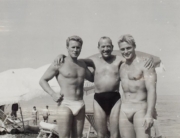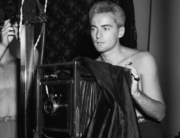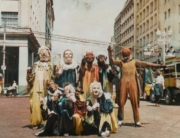Directors Joe Brewster and Michèle Stephenson take us into the life of Nikki Giovanni, a trailblazer of the civil rights era and a poet of ongoing distinction and importance, now in her 80th year. Much of this wide-ranging, enlightening documentary follows Giovanni in the here and now. She lives quietly with her partner, Virginia Fowler, in a modest, no-frills, yet cozy home, filled with books, art, photographs, and relics from the past (including a segregated bathroom sign), and teaches writing at Virginia Tech. With short, tight gray curls, and black eyeglasses oft perched on her head, she is slight, but still a force.
She recently has had seizures, which have affected her memory. “I don’t remember a lot of things,” she says in the opening, “but a lot of things I don’t remember I don’t choose to remember. I remember what’s important, and I make up the rest.” This statement, in a way, becomes the fulcrum of the film. With pain in her past (within her family and her life as a Black woman), there is a sort of benefit of not remembering. Yet Giovanni remains razor-sharp, with a remarkable finesse of language, wit, and storytelling. What is perhaps most heartening is her ongoing intergenerational appeal—from rapt children, high school students, twentysomethings, thirtysomethings (with whom she poses for selfies), to older adults. The venues filmed here range from a church, a literary festival, the Apollo, and Brooklyn’s Afropunk Festival.
Perspective is important in Giovanni’s work. Her poem, “Rosa Parks,” which, among other poems, is excerpted here, focuses on Parks, Emmett Till, and also the work of the Black Pullman porters on trains that crisscrossed the country, including those who may have been on Till’s train as he traversed North to South to where he was murdered. One a different subject at a library event, she humorously, but truthfully compares Rudolph the Red Nose Reindeer to an outsider who should have “cursed Santa out” for being tormented until he was needed. “If you got a talent, you’re lonely,” she adds. Her associations are memorable and perceptive.
As the film continuously moves between past and present, the importance of Black New York City bookstores in the 1960s and 1970s in selling her work and expanding Giovanni’s reach as a poet emerges. Seeing the vibrant, book-filled tables of these stores is just a piece of the amazing archival footage. It also prominently features conversations between Giovanni at age 28 with James Baldwin from the 1971 television program Soul! These are amazing exchanges. Facing each other in chairs in a tight space, the two are fascinating to watch together as Giovanni goes toe-to-toe with Baldwin’s older, blazing intelligence.
The title Going to Mars refers to an Afrofuturist philosophy of Giovanni’s found in her poem “Quilting the Black-Eyed Pea (We’re Going to Mars).” It encompasses the idea of Black women (“the most marvelous people on earth”) leaving the trappings of a dying Earth and traveling together to another planet anew. Brewster and Stephenson sometimes insert literal space imagery of astronauts and the cosmos, which can feel jarring, undermining Giovanni’s biting profundity. It is a small quibble in an otherwise arresting profile. The gentle, dreamy score by Chris Pattishall and Samora Pinderhughes guides things along beautifully, while Taraji P. Henson, who is also an executive producer here, occasionally provides narration of Giovanni’s work.
The film shines in the intimacy of its off-handed, smaller moments, such as when Giovanni’s teenaged granddaughter looks over her grandmother’s books on the shelves and the photos on the wall. There’s often a hopefulness in its everyday portrait. Going to Mars is another entry, alongside The Stroll, Kokomo City, and Silver Dollar Road, of excellent Black American-focused documentaries that tell unique and compelling stories.







Leave A Comment